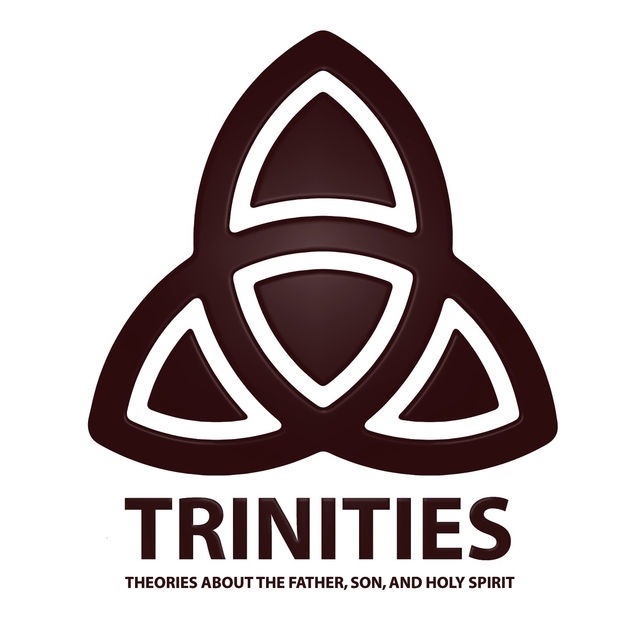
Trinities
Dale Tuggy
Weekly podcast exploring views about the Trinity, and more generally about God and Jesus in Christian theology and philosophy. Debates, interviews, and historical and contemporary perspectives. Hosted by philosopher of religion / analytic theologian Dr. Dale Tuggy.
- 1 hour 2 minutespodcast 383 – New Zealand Conference Church History Q and A with Sean Finnegan and Dale Tuggy – Part 2

At the start of this episode I have a very important announcement! Then you’ll hear day 2 – November 24, 2024 – of pastor Sean Finnegan and I fielding church history questions for New Zealand conference attendees.
Topics include: the only really trinitarian-sounding text in the New Testament (Matthew 28:19), the formation of the biblical canon, some ancient books which are not in any current-day Christian canon, books in the Catholic and Orthodox Bible but not in the Protestant ones, why some of these non-Protestant books can be useful for New Testament interpretation, the influences of Greek philosophy of catholic theologies, whether or not the idea of a tripersonal God is in pre-Christian pagan religions, the conservative nature of so-called fourth-century “Arianism” and where that name comes from, Arianism and Islam, how it came to be that “Arian” Christianity died out, present-day apologists’ demonstrably false claim that Christians have always been trinitarian and how we can know from the primary sources that this it is false,
Links for this episode:
Videos from the 2024 UK Internation UCA conference in Windsor
Sean Finnegan, “Is Matthew 28.19 a Forgery?”
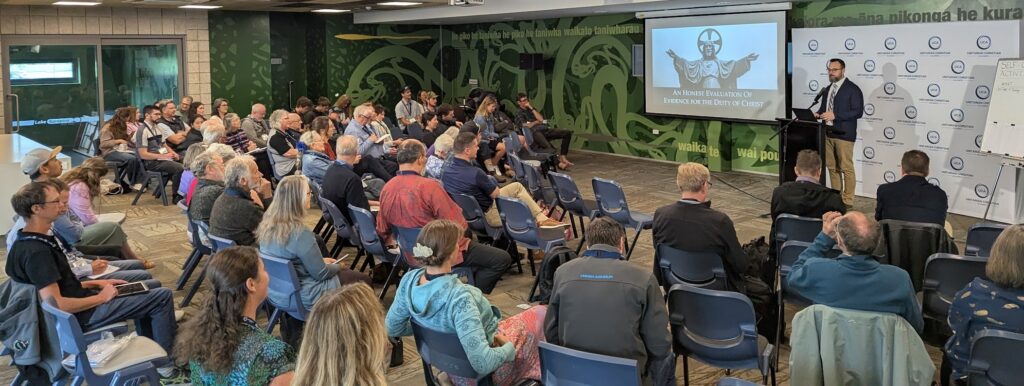
The 39th Festal Letter of Athanasius (367 CE)
The Development of the Canon of the New Testament
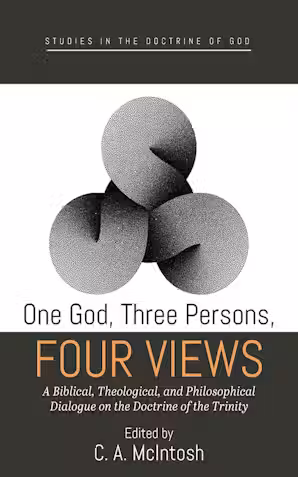
McIntosh, ed. One God, Three Persons, Four Views: A Biblical, Theological, and Philosophical Dialogue on the Doctrine of the Trinity
a scholarly article on the Ethiopian Canon(s)
How John 1 was intelligible in the first century
Dr. R.T. Mullins on “classical” (i.e. too Platonized) theism
Rowan Williams, Arius: Heresy and Tradition
Dale’s university lectures on Islam:
https://youtu.be/KMkrh46cfo8?si=WvtAVIduSwfwORxbpodcast 31 – Dr. William Hasker on the “Arian” Controversy
podcast 30 – The Council of Nicea
Rubenstein, When Jesus Became God: The Struggle to Define Christianity during the Last Days of Rome
Hanson, The Search for the Christian Doctrine of God: The Arian Controversy, 318-381
https://youtu.be/d9W_KjktIdk?si=Voh8BVGFQVt18iSX https://youtu.be/KxYtTQDo1dA?si=tKYXVBTB4R3AAxDt https://youtu.be/RmRdZmPIGrA?si=-Zi-DW0uRUJot1aPpodcast 175 – Marcellus of Ancyra
https://youtu.be/uk1aqpMlKyI?si=B53QCCwRhBNphEZ2podcast 5 – Anglicans Defending “Athanasius”
podcast 4 – Anglicans vs. “Athanasius”
podcast 3 – making Abelard cry
podcast 2 – the “Athanasian Creed”
15 December 2024, 4:06 am - 1 hour 6 minutespodcast 382 – New Zealand Conference Church History Q and A with Sean Finnegan and Dale Tuggy – Part 1

This episode is a live Q&A session from the first ever UCA Conference in New Zealand, held in a beautiful lakeside conference center in Cambridge. The venue was a 15-minute walk from where I stayed. The view from there was this!
Topics discussed include: unitarians throughout church history, Eusebius of Caesarea and his Church History, Theodotus of Byzantium, Artemon, Paul of Samosata, Photinus of Sirmium, the biblical canon in the early church, Athanasius, Arius and the so-called “Arian” controversy, the 325 council at Nicea, alternate readings of Matthew 28:19 in the works of Eusebius, Origen’s doctrine of God’s eternal generation of the Logos, Novatian of Rome, the influences of Platonic thought on early theology, pre-Nicene subordinationism, Plato’s Timaeus and his idea of the Demiurge (Craftsman), the idea of creation through one or more intermediaries, gnostic ideas about creation, Irenaeus and his Against Heresies, whether the idea of the Trinity comes from Greek philosophy, pagan and early Christian triadological speculations, changing meanings of the word “Trinity” (Greek: trias, Latin: trinitas) and when the term became popular, ancient subordinationists as unitarian Christians, the trinitarian idea that they were sort of trying to express belief in the Trinity, American congregationalist unitarians, William Ellery Channing, the idea of dividing unitarian Christians into “Socinians” and “Arians,” the historical events leading up to the Nicene Creed, the new controversial word homoousios (same essense or substance), the decree of Theodosius I and the 381 council which ended the Nicene controversy, the 381 “Nicene Creed” as the first implicitly trinitarian creed, the mainstream theological scene in the 100s and 200s, the idea that purely Hebraic apostolic thought was superseded by Greek thought, divine impassibility, timelessness, and simplicity, Numenius, first and second century crises in Israel, Justin’s Dialogue with Trypho, Epiphanius of Salamis, ancient Jewish Christians, and the idea of Restorationism.
The opinions expressed here are only those of the presenters, and do not represent official positions of the UCA. For those, see this.
Resources mentioned in this episode:

Living Hope International Ministries – LHIM
Williams, The Radical Reformation, 3rd edition
Gaston, Dynamic Monarchianism: The Earliest Christology? (video)
podcast 176 – Photinus of Sirmium – Trinities
McDonald, The Biblical Canon
Eusebius, The Church History, Ecclesiastical Theology, Oration in Praise of Constantine
Metzger, A Textual Commentary on the Greek New Testament
podcast 347 – Novatian’s On the Trinity – Part 1 – Almost Pope
podcast 348 – Novatian’s On the Trinity – Part 2 – Two Thieves and Three Arguments
Origen, On First Principles
Brakke, The Gnostics: Myth, Ritual, and Diversity in Early Christianity
podcast 167 – Lamson’s History of The Unitarian Congregationalists
podcast 308 – Channing’s “Unitarian Christianity” – Part 1
podcast 309 – Channing’s “Unitarian Christianity” – Part 2
podcast 30 – The Council of Nicea
Tuggy, What is the Trinity?
Tuggy, “When and How in the History of Theology Did the Triune God Replace the Father as the Only True God?“
https://www.youtube.com/live/etUHkoDdevU?si=2odbGy55wqlEO1-VDale’s 2024 presentation at the UK International Conference: podcast 381 – Mainstream Christian Theologies in the year 240: What Trinitarian Apologists Don’t Know
https://youtu.be/HgsdXLn3Iok?si=-lLvisD_FHhOk7ndHistory of the Early Christadelphians
This week’s thinking music is “for the glory of” by Dirk Dehler.
6 December 2024, 2:04 am - 1 hour 10 minutespodcast 381 – Mainstream Christian Theologies in the year 240: What Trinitarian Apologists Don’t Know
In videos like this one and this one, trinitarian apologists continue to push false narratives about the history of mainstream Christian theologies, like these (ordered from least to most plausible):
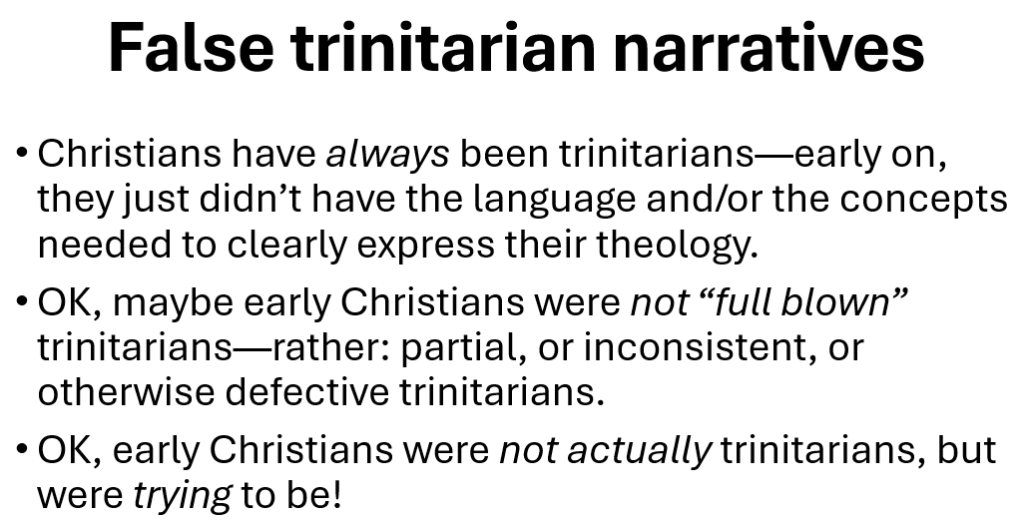
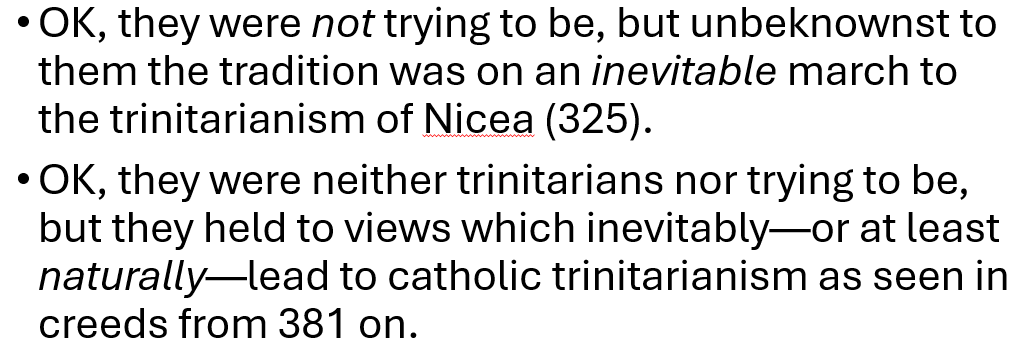
In this historical presentation, focusing on passages from Tertullian, Origen, and Novatian, I explain the actual early history of mainstream Christian theologies. Each of these three authors is a logos theorist, and I explain how they think God and the Logos (aka “the second god”) differ. “Subordinationism” is a feature, not a bug of these theologies; it is how they stay monotheistic despite positing multiple “divine” beings–only one “god” is strictly speaking a god. Each writer implies that logos theory was in their day a minority view; it seems that logos theories were at first popular among the “elite” and were widely rejected by other Christians. Each of these writers describes Christians who disagree with their Logos speculations. Since Harnack historians have called these Dynamic Monarchians and Modalistic Monarchians. Using the stick figures first deployed here, I explain the differences between these three mainstream Christian theologies, and between each of them and the trinitarian theology that was demanded by the mainstream starting in 381. Finally, I take a stab out outlining the actual early history of Christian theologies, starting with Dynamic Monarchianism and ending with the hegemony of trinitarianism.
Because of the many slides (and stick figures) I recommend the video version:
https://youtu.be/d9W_KjktIdk?feature=sharedThanks to Brandon Duke for editing the video and to Mark Cain for expertly cleaning up the lecture audio! Finally, my sincerest thanks to the tireless UK International Conference committee whose hard work made this encouraging meeting possible. Watch the UCA blog for an announcement of the next UK international conference!
Links for this episode:
Thomas Gaston, Dynamic Monarchianism: the Earliest Christology?
podcast 281 – Introducing the Unitarian Christian Alliance
Clarifying Catholic Christologies
podcast 270 – Origen’s “one God”
von Harnack on logos theories and mystery
Evolution of the Trinity – with Bill Schlegel
podcast 262 – The Trinity before Nicea?
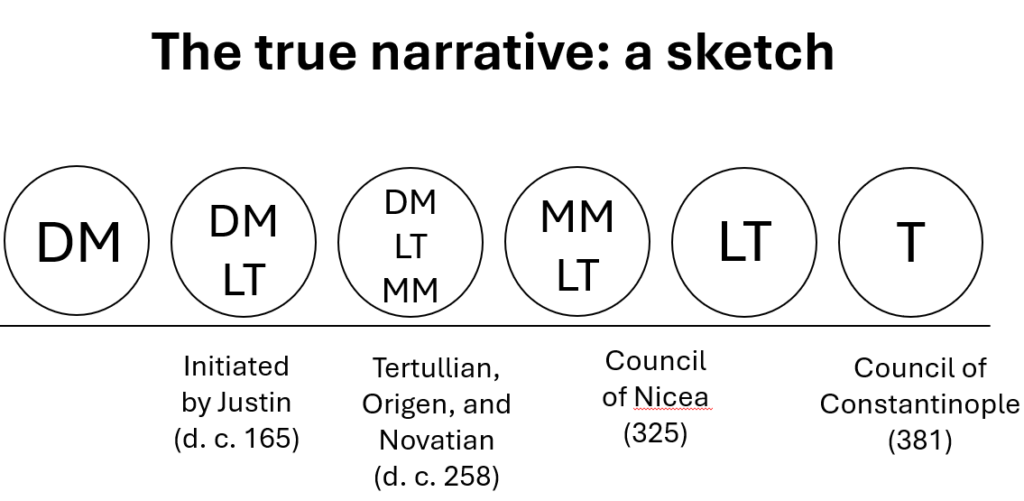
Hurtado on the early worship of Jesus
Craig: how Nicene orthodoxy rules out the full deity of Christ
Origen on the Challenge to Jesus is God Apologists
trinitarian or unitarian? 7 – Origen uncensored
Origen, Paul, and Peter: Christians worship the Jews’ god
Rufinus’s corruption of Origen’s On First Principles – Part 1
Rufinus’s corruption of Origen’s On First Principles – Part 2
podcast 24 – How to be a Monotheistic Trinitarian
This week’s thinking music is “Blood (Instrumental)” by Anthem of Rain.
15 August 2024, 7:40 pm - 58 minutes 49 secondspodcast 380 – Dr. Dustin Smith on Wisdom Christology in the Gospel of John

To understand a book as its author intended, you don’t look to its future, but rather to its past. What has this author read, and what could he presuppose his audience to have read? These other pieces of literature are like tools in the author’s hands.
The biblical book of Proverbs famously features a vivid personification, Lady Wisdom. She pleads with people to seek and find her, and she even appears alongside God when he is creating. As Dr. Dustin Smith explains, this character appears in a number of later ancient Jewish writings in various ways, and can even be described as “incarnate” in certain people. Many of these would have been accessible both to the author of John and his audience.
Paul famously writes that Christ is “the wisdom of God” (1 Corinthians 1:24). But as James Dunn has observed, this idea of Christ as God’s wisdom is more prominent in John than in any other New Testament book. Drawing on an impressive array of recent scholarship, in Wisdom Christology in the Gospel of John Dr. Dustin Smith argues that “the Johannine Jesus is incarnate Wisdom and that this christological presentation permeates all twenty-one chapters of the Fourth Gospel” (p. 213).
In this new discussion we focus on the basics of “wisdom christology” and on how that idea sheds light on the famous opening to the fourth gospel, John 1:1-18.
Links for this episode:
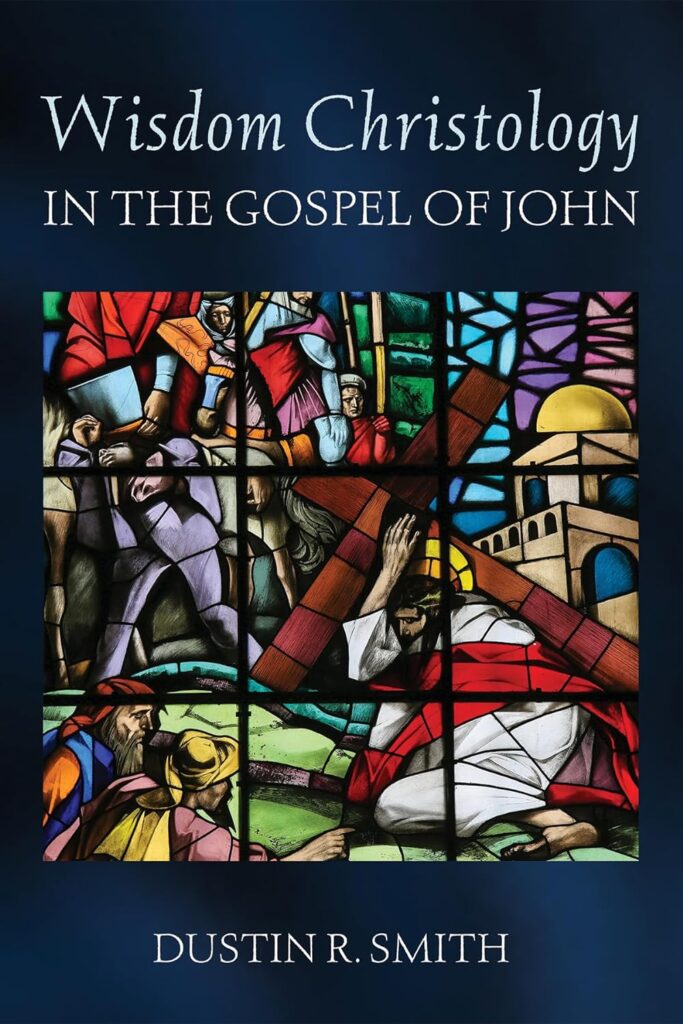
Smith, Wisdom Christology in the Gospel of John
Smith, The Son of God: Three Views of the Identity of Jesus
Transfigured: Dr. Dustin Smith – Wisdom Christology in the Gospel of John
previous trinities podcast episodes with Dustin Smith
podcast 301 – Dr. Daniel Boyarin on John 1
podcast 295 – James Martineau on John 1
John A. T. Robinson on “the Word” of John 1
How John 1 was intelligible in the first century
17 May 2024, 3:38 am - 1 hour 7 minutespodcast 379 – AI and I evaluate my debate with James White

The way to evaluate a debate is to actively chart and compare the arguments made by each side. Debaters call this “flowing” a debate.
I sat down and did this, working carefully all the way through my recent debate with James White on the question “Is Jesus Yahweh?”
In this episode I’ll give you my evaluation of the debate, with an assist from the cutting edge Chat Debate Beta AI. She and I even go so far as to declare a winner!
Do you agree? Why or why not? How would you have argued one side or the other differently
I’ve been interviewed several times about the debate; see the videos below.
https://youtu.be/BYmerZbCTLI?si=-PdxYVrxihx8OsYr https://youtu.be/rL69HKlnnPE?si=K7JNhUnQRyepeGvf https://youtu.be/aCtTBJPsPwc?si=LmF-J_PAAiC-h4QHLinks for this episode:
the fully produced video of the debate
Who Should Christians Worship?
Restitutio 451 Wisdom Christology in Hebrews 1.10-12 (Jerry Wierwille) July 8, 2022
Restitutio 450 Seven Interpretive Options for Hebrews 1.10-12 (Jerry Wierwille) June 30, 2022
Restitutio 449 Intertextuality and Interpretation of Hebrews 1 (Jerry Wierwille) June 23, 2022
This week’s thinking music is “Dit it and Quit It” by Van Loon.
23 March 2024, 2:22 am - 53 minutes 18 secondspodcast 378 – Debate: Is Jesus Yahweh? White vs. Tuggy – Part 2
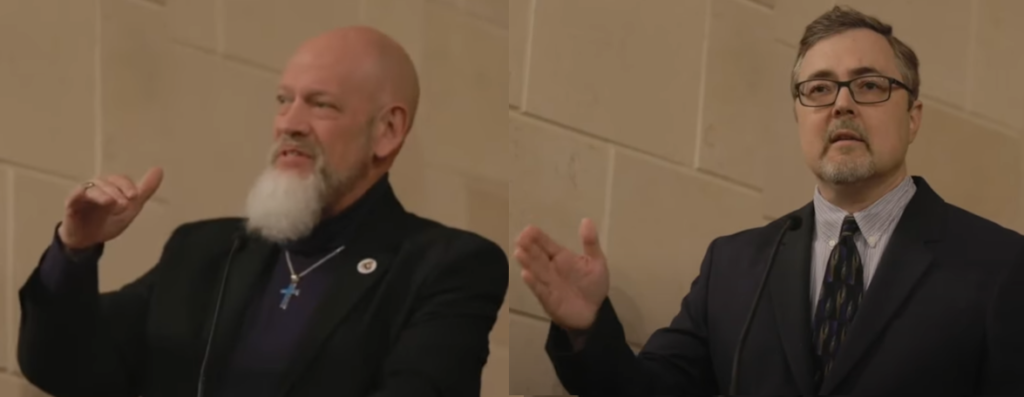
In this episode: mutual interrogations, closing statements, and audience questions and answers.
- Which side put forward the stronger opening case?
- Which did a better job in rebuttal?
- What if anything was revealed by the mutual interrogations?
- What if anything was added by the brief closing statements?
- And which answers to audience questions did you think were important, and why?
You be the judge.
In the next episode I’ll share some of my thoughts about this debate.
Thanks to James White and to the co-sponsors of the debate: First Lutheran Houston and the Unitarian Christian Alliance.
Links for this episode:
podcast 377 – Debate: Is Jesus Yahweh? White vs. Tuggy – Part 1
Restitutio 539 Dale Tuggy’s Thoughts on the James White Debate: Is Jesus Yahweh?
the fully produced UCA version of the debate video
Restitutio 450 Seven Interpretive Options for Hebrews 1.10-12 (Jerry Wierwille)
16 March 2024, 3:07 pm - 1 hour 15 minutespodcast 377 – Debate: Is Jesus Yahweh? White vs. Tuggy – Part 1
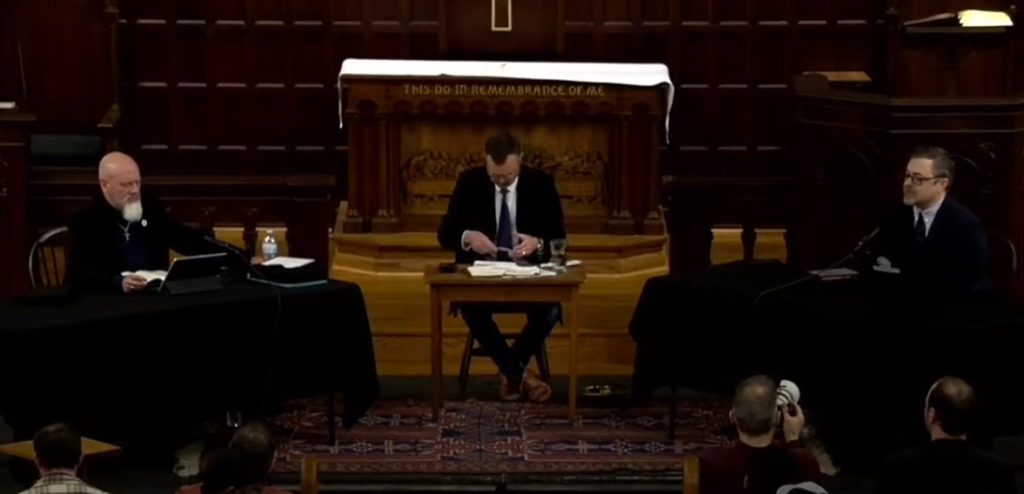
This episode contains the Pro and Con opening statements and rebuttals from the debate on March 9, 2024 between James White and Dale Tuggy in Houston, Texas. The debate question is “Is Jesus Yahweh?”
Which side makes the stronger opening arguments? Which side does a better job at rebutting the other’s opening arguments?
Because of our many slides, the fully edited video version below is recommended. (However, the above podcast audio-only version above has some groovy Thinking Music in between the segments.)
https://youtu.be/ky2SaHscSIo?si=6NmO6gpnDzrjC1oaMy thanks to the host Pastor and Moderator Evan McClanahan of First Lutheran Houston, James White, the UCA Podcast‘s host and producer Mark Cain, who masterfully cleaned up the source audio, and UCA Board Member Brandon Duke, who produced the video above.
Links for this episode:
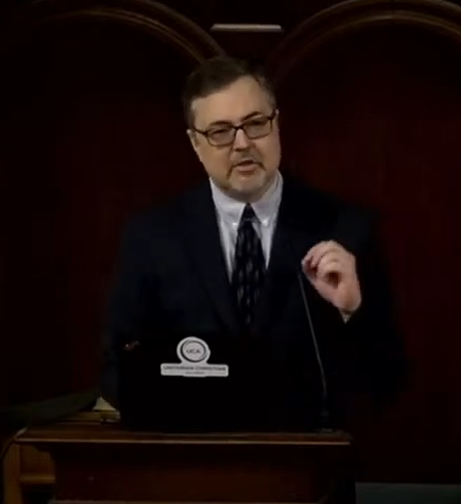
pdf of Tuggy’s opening Con statement
A letter from the Lord Jesus: About God and Me (Revised)
podcast 344 – Craig’s Contradictory Christ – Part 2
podcast 343 – Craig’s Contradictory Christ – Part 1
podcast 341 – Reflections on my debate with Dr. Andrew Loke
podcast 340 – Does the New Testament teach that Jesus is truly divine? – Loke vs. Tuggy – Part 2
podcast 339 – Does the New Testament teach that Jesus is truly divine? – Loke vs. Tuggy – Part 1
podcast 87 – Kermit Zarley on the deity and preexistence of Jesus
podcast 332 – Emlyn’s Humble Inquiry
Debate – “Is Jesus Human and not Divine?” – Dr. Dale Tuggy vs. Chris Date
podcast 144 – Dr. Timothy Pawl’s In Defense of Conciliar Christology – Part 2
podcast 143 – Dr. Timothy Pawl’s In Defense of Conciliar Christology – Part 1
14 March 2024, 1:05 am - 53 minutes 23 secondspodcast 376 – The Trinity, the Deity of Christ, and the Best Craig – Part 2

This is the final part of my response to some recent podcast episodes by Dr. William Lane Craig here and here.
Dr. Craig accuses me of being disingenuous in claiming that his minimal, so-called “biblical” doctrine consisting of two sentences is not enough to count as a trinitarian theology. I stand by that claim, and point out that it is unclear why Dr. Craig thinks that those sentences say anything about a tripersonal God.
I also discuss his claim that his rival hypothesis, that the New Testament authors assumed those two sentences, explains the 20 facts I build my case on in the forthcoming debate book. I don’t discuss all 20 facts here, but I describe the 5 facts that I presented in the recent book panel session, and point out that Craig’s hypothesis in fact doesn’t explain any of those, in contrast to the hypothesis I call “U,” that the New Testament authors assume that the one God just is the Father and that neither the Son nor the Spirit are fully divine.
In his recent podcast Dr. Craig also seems to suggest that I think there is one doctrine of the Trinity, and that in the debate book I attacked a straw man theology which no trinitarian holds. I point out that both claims are mistaken. I also discuss the two different Trinity theories he has presented, pointing out that one could be true while the other is false.
Finally, I summarize the shortcomings of our recent interactions and I challenge Dr. Craig to a full-length, face to face public debate, suggesting four topics:
- The New Testament teaches that the one God is tripersonal.
- The Gospel According to John teaches that Jesus and the Father are equally divine.
- The Chalcedonian doctrine of a divine and human Jesus is coherent.
- The New Testament teaches that Jesus and the Father are equally divine.
Links for this episode:
podcast 375 – The Trinity, the Deity of Christ, and the Best Craig – Part 1
podcast 374 – Book Session Identity Crisis – Part 3
podcast 373 – Book Session Identity Crisis – Part 2
podcast 372 – Book Session Identity Crisis – Part 1
Reasonable Faith Podcast: Trinitarianism vs Unitarianism Part One
Reasonable Faith Podcast: Trinitarianism vs Unitarianism Part Two
“Craig’s Contradictory Christ”
“Trinity,” Stanford Encyclopedia of Philosophy
This week’s thinking music is “Hi as Hats” by Van Loon.
19 February 2024, 3:52 am - 55 minutes 37 secondspodcast 375 – The Trinity, the Deity of Christ, and the Best Craig – Part 1
In this episode I first explain what I mean by “the best Craig” and why in my view we’re not getting that in some recent responses to my arguments. I then respond to some recent podcast episodes by Dr. William Lane Craig here and here, where Craig is not engaging with my arguments, instead dismissing me as a fringe kook who can be safely ignored.
I note how quickly he jumps from the Trinity to the Incarnation, and I challenge him to explain why, on biblical grounds, a doctrine of the Trinity is essential for Christianity. I also point out some mistakes and misunderstandings, as well as his failure to engage with my published critique of his Neo-Apollinarian christology and my views on the fourth gospel.
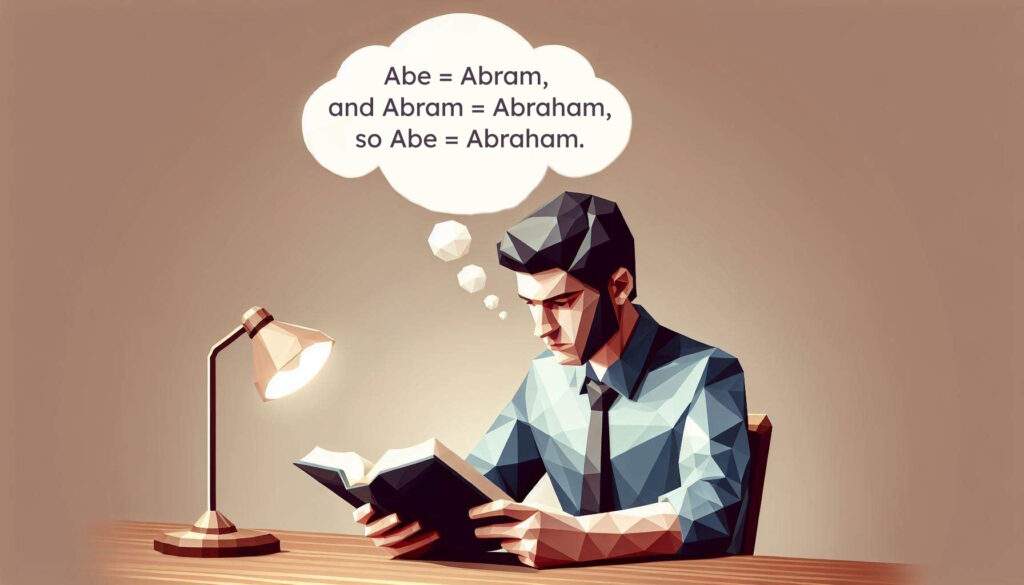
We again revisit what Craig calls “the modern relation of identity” (really: a modern understanding of identity) and I point out what is now an area of agreement about the concept of identity. Yet based on his recent remarks, Craig doesn’t understand what I think about the identity of God and the Father in the New Testament.
I refute his recent allegation that no New Testament scholar thinks that nowhere in the New Testament is Jesus taught to be fully divine; my counterexample is the famous and influential James Dunn. I then offer a few thoughts on his fallback objection that the vast majority of New Testament scholars would disagree.
Lastly, I respond to his brief argument from divine providence and the fourth gospel. Am I committed to God failing in his promised post-resurrection revelation?
Links for this episode:
podcast 374 – Book Session Identity Crisis – Part 3
podcast 373 – Book Session Identity Crisis – Part 2
podcast 372 – Book Session Identity Crisis – Part 1
Reasonable Faith Podcast: Trinitarianism vs Unitarianism Part One
Reasonable Faith Podcast: Trinitarianism vs Unitarianism Part Two
Craig, In Quest of the Historical Adam: A Biblical and Scientific Exploration
Craig and van Inwagen, Do Numbers Exist?
4 views on the Trinity – William Lane Craig, Dale Tuggy, Beau Branson, William Hasker
the arguments Dr. Craig didn’t want his podcast audience to hear
podcast 270 – Origen’s “one God”
Does God Exist? William Lane Craig vs. Christopher Hitchens – Full Debate
Gaston, Dynamic Monarchianism: The Earliest Christology?
Restitutio Podcast 528 Dynamic Monarchianism: The Earliest Christology (Thomas Gaston)
podcast 176 – Photinus of Sirmium
podcast 286 – Is the Trinity Essential? – Three Views

podcast 291 – From one God to two gods to three “Gods” – John 1 and early Christian theologies
podcast 338 – What John 1 Meant
“Craig’s Contradictory Christ”
podcast 344 – Craig’s Contradictory Christ – Part 2
podcast 343 – Craig’s Contradictory Christ – Part 1
How much did Aristotle understand about numerical sameness (identity)?
Dunn, Christology in the Making
Dunn, Did the First Christians Worship Jesus?
SEP “Trinity” 1.4 The Trinity as Incoherent
Molinism, a.k.a. Middle Knowledge
17 February 2024, 2:43 pm - 1 hour 1 minutepodcast 374 – Book Session Identity Crisis – Part 3

This episode is the final portion of the EPS session devoted to the forthcoming book, One God, Three Persons, Four Views, edited by Dr. Chad McIntosh. You’ll hear the entire Q&A portion of the session, plus my commentary thereupon. Topics include:
- Jesus and the “one like a son of man” in Daniel 7
- Jesus’ claim in Mark 2 and in Matthew 9 to be authorized to forgive sins
- the accusation of blasphemy lobbed at Jesus in Mark 14:61-64.
- the “worship” of Jesus in Matthew 2 and elsewhere
- how Revelation 1 describes the exalted Jesus in similar terms to the Ancient of Days in Daniel 7
- the title “Alpha and Omega” which is used in Revelation for both God and Jesus
- whether John 15:3 implies that it must have been God who died for our sins
- whether Romans 10:9 shows that in Paul’s view Jesus is Yahweh
- whether being begotten by God implies being God, and the charge in John 10 that Jesus is “making himself God”
- John 17:5 and the issue of Jesus’s pre-human existence in the New Testament
- whether John 12:41 implies that Jesus is Yahweh
- John 1 and the deity of Christ
- that the Hebrew echad can refer to non-simple, complex unities

There is also a question about and some more discussion of Dr. Craig’s controversial claim that it is an anachronism to suppose that New Testament authors could make claims involving the concept of numerical identity. I point out that any normal adult, then or now, can wonder, after twice referring, if they’ve referred to the same thing twice or rather to two things in succession. I also point out that the anti-modalist plank of trinitarian confessions, even ancient ones, employs the concept of same-thing-as when it denies that any “Person” of the Trinity is numerically the same with any of the others (i.e. that all of these are false: f = s, s = h, h = f).
For his part, Dr. Craig asks me if I accept a Socinian account of atonement, and you’ll also hear the humorous end of this panel session, as the editor Dr. McIntosh hands out clever gifts to each of the four authors.
In the final segment I critique some answers Dr. Craig has recently given on his podcast to some listener questions about the Bible and “the Trinity,” also offering my own answers.
Links for this episode:
podcast 373 – Book Session Identity Crisis – Part 2
podcast 372 – Book Session Identity Crisis – Part 1
Reasonable Faith Podcast: Questions on Morality, the Trinity, and Retirement, December 11, 2023
1 Chronicles 20:29; Philippians 2:9-11; Romans 5; Matthew 1:23; John 1:1; Mark 12:28-34; Deuteronomy 6:4; Deuteronomy 4:35; John 14:28; John 1:18; John 20:28; John 20:17; John 10:31-36; John 20:30-31; John 14:9; Acts 17:11.
How much did Aristotle understand about numerical sameness (identity)?
Craig, Atonement and the Death of Christ
fulfillment fallacy: the Bible teaches that David is God
fulfillment fallacy: the Bible on another previous life of Jesus
podcast 235 – The Case Against Preexistence
podcast 338 – What John 1 Meant
podcast 334 – “Who do you say I am?”
podcast 70 – The one God and his Son according to John
https://youtu.be/GJCZervdJEk?si=ZEXG17kAqVYRiDEGpodcast 146 – Jesus as an Exemplar of Faith in the New Testament
podcast 92 – Dr. Joshua Thurow on objections to atonement theories
podcast 91 – Dr. Joshua Thurow on theories of the atonement
24 December 2023, 3:09 am - 1 hour 22 minutespodcast 373 – Book Session Identity Crisis – Part 2Is it true that most ancients lacked the concept of numerical identity?5 December 2023, 3:08 am
- More Episodes? Get the App
Your feedback is valuable to us. Should you encounter any bugs, glitches, lack of functionality or other problems, please email us on [email protected] or join Moon.FM Telegram Group where you can talk directly to the dev team who are happy to answer any queries.
 Restitutio
Restitutio
 Restitutio Classes
Restitutio Classes
 Logos Institute Podcast
Logos Institute Podcast
 LHIM Weekly Bible Teachings
LHIM Weekly Bible Teachings
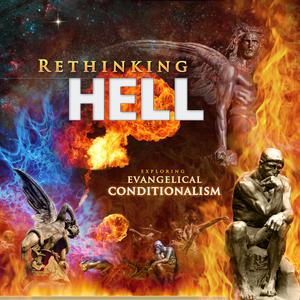 Rethinking Hell
Rethinking Hell